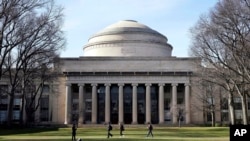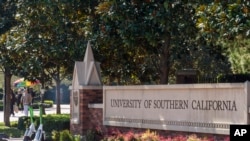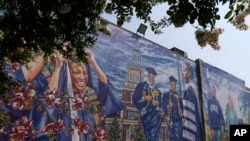Student Union
- By Reuters
Columbia suspends pro-Palestinian protesters after encampment talks stall
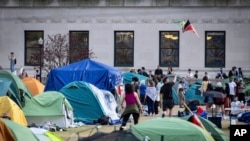
Columbia University on Monday began suspending pro-Palestinian activists who refused to dismantle a tent encampment on its New York City campus after the Ivy League school declared a stalemate in talks seeking to end the polarizing protest.
University President Nemat Minouche Shafik said in a statement that days of negotiations between student organizers and academic leaders had failed to persuade demonstrators to remove the dozens of tents set up to express opposition to Israel's war in Gaza.
The crackdown at Columbia, at the center of Gaza-related protests roiling university campuses across the U.S. in recent weeks, came as police at the University of Texas at Austin arrested dozens of students whom they doused with pepper spray at a pro-Palestinian rally.
Columbia sent a letter on Monday morning warning that students who did not vacate the encampment by 2 p.m. ET and sign a form promising to abide by university policies would face suspension and become ineligible to complete the semester in good standing.
"We have begun suspending students as part of this next phase of our efforts to ensure safety on our campus," said Ben Chang, a university spokesperson, at a briefing on Monday evening.
"The encampment has created an unwelcoming environment for many of our Jewish students and faculty and a noisy distraction that interferes with the teaching, learning and preparing for final exams," Chang said.
Earlier, Shafik said Columbia would not divest from finances in Israel, a key demand of the protesters. Instead, she offered to invest in health and education in Gaza and make Columbia's direct investment holdings more transparent.
Protesters have vowed to keep their encampment on the Manhattan campus until Columbia meets three demands: divestment, transparency in university finances, and amnesty for students and faculty disciplined for their part in the protests.
"These repulsive scare tactics mean nothing compared to the deaths of over 34,000 Palestinians. We will not move until Columbia meets our demands or we are moved by force," leaders of the Columbia Student Apartheid Divest coalition said in a statement read at a news conference following the deadline.
Hundreds of demonstrators, many wearing traditional Palestinian keffiyeh scarves, marched in circles around the exterior of the encampment chanting, "Disclose! Divest! We will not stop, we will not rest."
Shafik faced an outcry from many students, faculty and outside observers for summoning New York City police two weeks ago to dismantle the encampment.
After more than 100 arrests were made, students restored the encampment on a hedge-lined lawn of the university grounds within days of the April 18 police action.
Since then, students at dozens of campuses from California to New England have set up similar encampments to demonstrate their anger over the Israeli operation in Gaza and the perceived complicity of their schools in it.
The pro-Palestinian rallies have sparked intense campus debate over where school officials should draw the line between freedom of expression and hate speech
Students protesting Israel's military offensive in Gaza, including some Jewish peace activists, have said they are being censured as antisemitic merely for criticizing the Israeli government or for expressing support for Palestinian rights.
"The movement itself is not antisemitic," said Nicholas Fink, a freshman history major at Columbia who has not participated in the protests.
He is among a few dozen Jewish students who met privately with U.S. House of Representatives Speaker Mike Johnson during a campus visit by Republican members of Congress last week. Johnson and other congressional Republicans have claimed that Columbia and other universities have turned a blind eye to antisemitic hostility and harassment on campus.
Some Jewish groups argue that anti-Israel rhetoric frequently delves into or feeds overt forms of anti-Jewish hatred and calls for violence, and thus should not be tolerated
Student protests abound
At the University of California, Los Angeles, where opposing sides clashed over the weekend, pro-Israeli activists set up a large screen and loudspeakers to play a tape loop of the Oct. 7 attack on Israel by Hamas militants. The video appears aimed at countering pro-Hamas chants that seeped into campus protests in support of Palestinian civilians besieged in Gaza.
UCLA also stepped-up security around a pro-Palestinian encampment, consisting of more than 50 tents surrounded by metal fencing near the main administration building on campus.
Civil rights groups have criticized law enforcement tactics on some campuses, such as Atlanta's Emory University and the University of Texas at Austin, where police in riot gear and on horseback moved against protesters last week, taking dozens into custody before charges were dropped for lack of probable cause.
Protests, and arrests, flared anew on the Austin campus on Monday.
Campus police backed by Texas state troopers attempted to break up a large student protest using pepper spray and flash-bang charges, arresting at least 43 people, according to defense attorney George Lobb, who said he confirmed the number with court and jail staff processing the detentions.
Video posted on social media showed police pulling individual students from a gathering on a grassy area where demonstrators sat and locked arms, some of them shouting, "Let them go!" State troopers in riot gear stood guard behind the uniformed police.
Virginia Tech said on Monday that 91 protesters arrested on Sunday night at a student-led encampment had been charged with trespassing. Video posted on social media showed demonstrators chanting, "Shame on you" as some were taken into custody.
See all News Updates of the Day
Malaysian official: Schools can’t turn away from global tensions
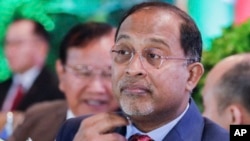
Zambry Abdul Kadir, Malaysia’s higher education minister, said protests spreading across universities in the United States show that schools can’t ignore political tensions.
Helen Packer, reporting in Times Higher Education, said the minister reminded educators that universities are key in the development of leaders, individuals and societies. (April 2024)
Social media breaks are difficult, but necessary

Between online classes, maintaining social connections and working on projects, college students can have a hard time disengaging from the demands of technology.
In Florida International University’s PantherNOW, Ariana Rodriguez offers strategies for taking a break from social media. (April 2024)
- By Melos Ambaye
Many master's degrees aren't worth the investment, research shows
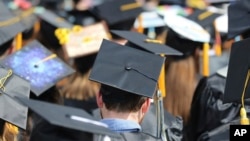
Nearly half of master's degrees have a negative financial return, according to new research by the Foundation for Research on Equal Opportunity, an economic research organization.
The study indicates that many graduate degree programs do not increase lifetime earnings enough to be worth it.
While 23% of bachelor’s degree programs yield a negative financial return on investment, 43% of two-year degrees and master’s degrees fail to deliver a return, according to the study by Preston Cooper, a senior fellow at FREOPP.
Cooper assessed the return on investment for 53,000 degree and certificate programs to determine whether a student’s lifetime earnings outweigh program costs and the risk of not completing their degree.
His findings show that a student’s field of study was the overriding indicator of return on investment at the undergraduate and graduate level.
Engineering, computer science and nursing bachelor’s degrees have high financial returns on investment, while programs in education, fine arts, psychology and English usually have low returns.
Graduate degrees in medicine and law tend to have strong payoffs. But a large share of master’s programs, including the MBA, frequently have low payoffs, according to Cooper.
Although workers with master’s degrees earn 16% more than those with only bachelor’s degrees, Cooper says the figure fails to account for students who had “higher preexisting earnings potential.”
“MBA students typically have high preexisting earnings potential, having often chosen high-ROI undergraduate majors such as finance and economics,” Cooper writes. “So the MBA adds little value on top of that.”
The study indicates that high starting salaries are predictors of high returns on investment. Degrees with starting salaries of $57,000 a year or more deliver the best lifetime returns.
But the return on investment of a degree can vary depending on the educational institution.
“Students interested in fields with low average pay can still find some schools that do well transforming those fields of study into high-paying careers,” Cooper writes.
The quality of an institution also matters, said William Tierney, professor emeritus of higher education at the University of Southern California.
“An MBA from Harvard is a likely ticket to a good job,” Tierney told VOA. “An MBA from the University of Phoenix, less so.”
But students pursue graduate programs for more than just financial reasons.
“Some degrees open up careers in fields that students may enjoy, such as in the performing arts,” Robert Kelchen, head of educational leadership at the University of Tennessee, Knoxville, told VOA.
“Others can help gain access to social networks or simply help students learn about a topic that is of interest,” Kelchen added.
Cooper told VOA that it might make sense for students in degree programs with low returns on investment to switch majors if they can still graduate on time.
He found the worst outcome for a student’s return on investment is dropping out of college “because they must pay for one or more years’ tuition and spend time out of the labor force.”
Lawmakers who fund higher education have a responsibility in ensuring “higher education delivers on its promise of economic mobility,” Cooper said.
Nearly a third of federal funding, including Pell grants and student loans, pays for higher education programs that fail to provide students with a return on investment, according to the study.
Cooper’s view is that “some schools should shut down low-ROI programs and reallocate institutional resources to programs with a better return.”
“There's definitely this narrative out there that higher education is always worth it, and you should always try to get that extra degree because it will increase your earnings,” he told VOA. “That's reinforced by colleges who make lofty promises regarding their graduate degree programs' outcomes, which all too often fall short.”
Harvard students end protest as school agrees to discuss Gaza conflict
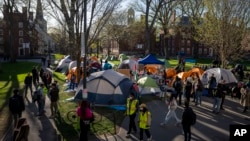
Protesters against the war between Israel and Hamas were voluntarily taking down their tents in Harvard Yard on Tuesday after university officials agreed to discuss their questions about the endowment, bringing a peaceful end to the kinds of demonstrations that were broken up by police on other campuses.
The student protest group Harvard Out of Occupied Palestine said in a statement that the encampment "outlasted its utility with respect to our demands." Meanwhile, Harvard University interim President Alan Garber agreed to pursue a meeting between protesters and university officials regarding the students' questions.
Students at many college campuses this spring set up similar encampments, calling for their schools to cut ties with Israel and businesses that support it.
The Israel-Hamas war began when Hamas and other militants stormed into southern Israel on October 7, killing some 1,200 people and taking 250 hostages. Palestinian militants still hold about 100 captives, and Israel's military has killed more than 35,000 people in Gaza, according to Gaza's Health Ministry, which doesn't distinguish between civilians and combatants.
Harvard said its president and the dean of the Faculty of Arts and Sciences, Hopi Hoekstra, will meet with the protesters to discuss the conflict in the Middle East.
The protesters said they worked out an agreement to meet with university officials, including the Harvard Management Company, which oversees the world's largest academic endowment, valued at about $50 billion.
The protesters' statement said the students will set an agenda that includes discussions on disclosure, divestment, reinvestment and the creation of a Center for Palestine Studies. The students also said that Harvard has offered to retract suspensions of more than 20 students and student workers and back down on disciplinary measures faced by 60 more.
"Since its establishment three weeks ago, the encampment has both broadened and deepened Palestine solidarity organizing on campus," a spokesperson for the protesters said. "It has moved the needle on disclosure and divestment at Harvard."
Chinese students report interrogations, deportations at US airports
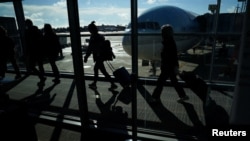
Academics from China are reporting increased scrutiny at U.S. airports, with valid visa holders being interrogated and turned away by Customs and Border Protection Agents.
Phones and laptops have been searched, and researchers have undergone extensive questioning about their work. One graduate student at Yale, who was midway through her PhD, was turned back at Dulles airport and banned from entering the U.S. for five years, according to The Guardian.





